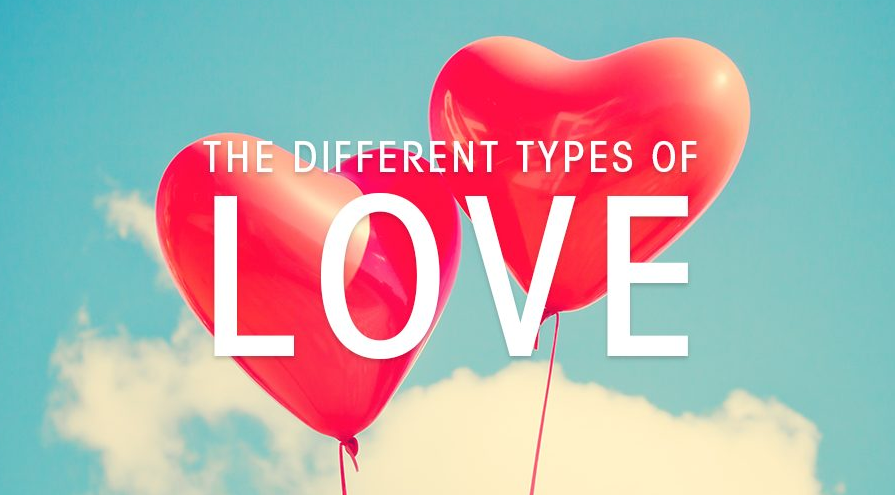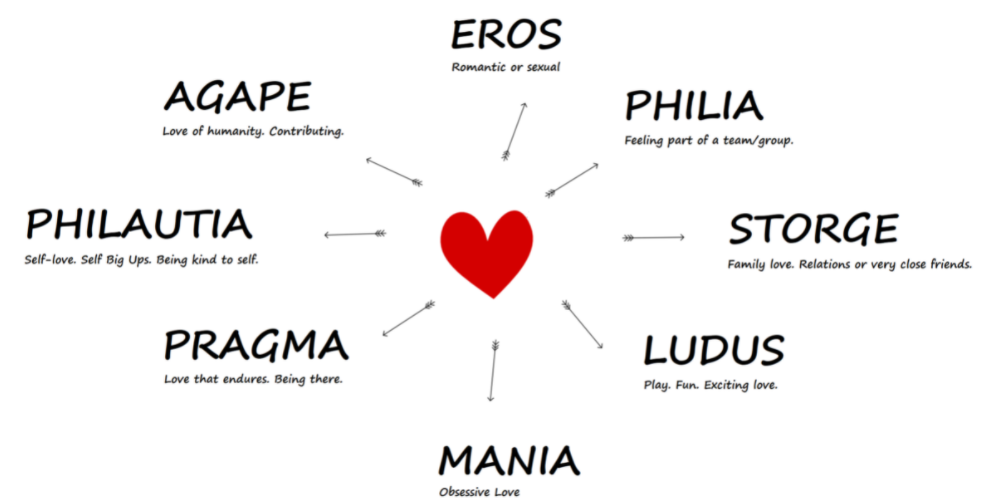
What are the different types of love, you might ask?
Since this is February, the month of love, I’m sharing this informative and helpful information once again.
There are 8 different types of love according to the ancient Greeks.
1. Philia — Affectionate
Philia is without romantic attraction and occurs between friends or family members. It occurs when both people share the same values and respect each other — it’s commonly referred to as “brotherly love.”
2. Pragma — Enduring Love
Pragma is a unique bond that matures over many years. As a result, it’s everlasting between a couple that chooses to put equal effort into their relationship. Commitment and dedication are required to reach “Pragma.” You are “standing in love” with the partner you want by your side indefinitely.
3. Storge — Familiar Love
Storge is a naturally occurring, rooted in parents and children, as well as best friends. Therefore, it’s infinite, built upon acceptance and deep emotional connection. This type comes easily and immediately in parent and child relationships. *(there are exceptions with a lack of bonding, between a parent and a child)
4. Eros — Romantic
Eros is primal, that comes as an instinct for most people. Also, it’s passionate and displayed through physical affection. These romantic behaviors include, but are not limited to, kissing, hugging, and holding hands. This is a desire for another person’s physical body.
5. Ludus — Playful
Ludus is child-like and flirtatious, commonly found in the beginning stages of a relationship (a.k.a. the honeymoon stage). This consists of teasing, playful motives, and laughter between two people. Although, common in young couples, older couples who strive for this love find a more rewarding relationship.
6. Mania — Obsessive
Mania is obsessive towards a partner. So, due to this, it leads to unwanted jealousy or possessiveness — known as codependency. Most cases are found in couples with an imbalance of love towards each other. An imbalance of Eros and Ludus is the main cause of Mania. As a result of healthy levels of playful and romantic love, the harm of obsessive love can be avoided.
7. Philautia — Self Love
Philautia is a healthy form, where you recognize your self-worth and don’t ignore your personal needs. Self-love begins with acknowledging your responsibility for your well-being. For instance, when you take care of yourself, physically, emotionally, mentally and spiritually, you will be happier in every respect.
8. Agape — Selfless
Agape is the highest level of love to offer. Consequently, it’s given without any expectations of receiving anything in return. Offering Agape is a decision to spread love in any circumstances — including destructive situations. Hence, Agape is not a physical act, it’s a feeling, but acts of self-love can elicit Agape since self-monitoring leads to results.
The Perfect Combo for You
Like a bouquet, utilizing a combination of these different types, can create something beautiful that leaves a lasting impression. Blossom your connections with the best combination of love. Though there isn’t a perfect equation for every relationship, these combinations can provide a perspective on how to work various types into your relationships. After all, a happy heart is a healthy heart!
As a result of researching this, I found the information to be helpful in creating better relationships. With knowledge and awareness, comes clarity.
Consequently, you have more choices as you are strengthening your relationships.
Lastly, thanks to the ancient Greeks, we can learn from all the different types. Because of these distinctions, we can learn that to genuinely enjoy eros we must also search for greater depths through philia and cultivate ludus, avoiding mania as our relationships mature. It’s through these efforts that we’ll find pragma in our relationships.
Here is the link I used to obtain most of this information. You will find other helpful tools within this article:
Above all, I hope you found this as fascinating as I have! Hoping you will use this information to strengthen your relationships.
With love and appreciation,
Connie
To read more of my blogs:






Leave a Reply